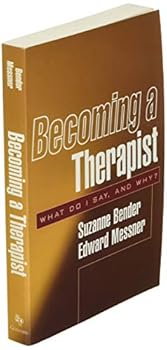Becoming a Therapist: What Do I Say, and Why?
Select Format
Select Condition 
Book Overview
Customer Reviews
Rated 5 starsWhat you wish you'd asked about
This book gives good dialogue type examples for many common situations encountered in therapy. There were many things one may not have even considered - like calling out the name of a client you've not yet met to identify them in the waiting room instead of announcing your presence so they can identify themselves to you. Who would have thought about preserving confidentiality in the way you first identify your new client?...
0Report
Rated 5 starsI wish I had this book when I was in psychiatric training!
Becoming a Therapist is the only book I have seen that covers this topic in a clinically relevant and non-intimidating way. It's extremely readable and covers the perfect range of topics from the first phone call to termination. We use this book in an introduction to therapy course for first year psychiatric residents. The book is universally praised by them (and the only book they all buy). I believe that this book is...
0Report
Rated 5 starsgood book
Very good book focusing on detailed examples of what to say and why. The format is: Intro, examples (good and bad) regarding how to handle things as a therapist, and then follow up commentary. Easy and clear to read. (I am a new Psych grad student.)
0Report
Rated 5 starsA classic for therapists, a compelling read
This thorough, compelling and entertaining book promises to become a classic in its field. The authors take the reader into the complex and fascinating terrain of the psychotherapist's office, and, better yet, into the therapist's head. The therapist-in-training learns how to talk and listen to patients, deal with problems as they arise, manage his/her own feelings dealing with a patients. This can also be a useful book for...
0Report
Rated 5 starsHelpfully concrete and friendly guidance
Another, less elegant title for this book might be, "Everything new therapists want to know, but are afraid to ask." Drs. Bender and Messner have gotten down to the very basics here, in a way which is friendly, yet firm; concrete, but backed by solid psychodynamic theory. They even write about mistakes they have made in their own practices, something which is not commonly done in this genre. This book would have saved me...
0Report













